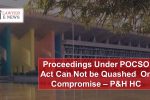S.27 Evidence Act | Confession to police is admissible U/S 67 NDPS Act if Inculpatory Material Discovered -P&H High Court

The Punjab and Haryana High Court has ruled that Section 67 of the NDPS Act preserves the application of Section 27 of the Indian Evidence Act to offences created under the NDPS Act and does not expressly repeal it.
Additionally, Section 67 of the NDPS Act does not expressly preclude the applicability or authority of Section 27 of the Indian Evidence Act (supra), which as previously mentioned is an exception to Section 25 of the Indian Evidence Act, because it does not contain a nonobstante clause.
The court panel, which included Justice Sureshwar Thakur, also stated that there is no conflict between Section 67 of the NDPS Act and either Section 25 or Section 27 of the Indian Evidence Act.
The bail petitioner, who was being held in judicial custody as a result of a FIR filed in accordance with the provisions of the Narcotic Drugs and Psychotropic Substances Act, 1985, was asking the court to release him from detention.
The case-relevant facts include the accuser Anuj Kumar’s disclosure statement, in which he identified the applicant as the source of the psychotropic chemicals found in his purported conscious and exclusive possession. The bail petitioner was consequently taken into custody.
In order to determine whether the seizure falls under the category of small quantity, intermediate quantity, or commercial quantity, the court relied on the Apex Court’s ruling that not only the weight of the prohibited salt, carried in the seized psychotropic substance, but also the entire weight of the seizure, is to be borne in mind. The seizure in the current case falls under the category of commercial quantity.
As a result, Section 37 of the NDPS Act comes into play, and the bail applicant is thus inherently ineligible for bail.
The court noted that Section 25 of the Indian Evidence Act would apply to all confessional statements made to officers looking into crimes. The Indian Evidence Act’s Section 25 does, however, have an exemption to it in Section 27.
Any confessional comments that were made to them would be prohibited by Section 25 of the Indian Evidence Act, and as a result, they could not be used to convict anyone of a crime under the NDPS Act. When an accused person provides a confession or information to a police officer, particularly during the course of the officer’s custody interrogation, and when later the fact confessed or the information revealed by the accused person to the police officer concerned is discovered, the bar against the inadmissibility of a bal is evident from a careful analysis of the provisions contained in Section 27 of the Act (supra).
The court further observed that, barring limited circumstances, the information provided by the accused to the investigating officer must result in the identification of the information provided during the accused’s interrogation while in custody.
The court made a point of pointing out that Section 67 of the NDPS Act gives the authorised officer the authority to request information about the violation from anyone during the course of an investigation.
Regarding the facts of the current case, the court noted that during Anuj’s incarceration, a disclosure statement was made against the bail applicant, and that this statement did, in fact, result in the appropriate finding of incriminating call detail records, bank records, and stock registers.
It was decided that if the person from whom the arrested person obtained possession of the pertinent seizure was implicated in the offence, then that person would likewise be held vicariously accountable.
However, any incriminating information, even if it exists contemporaneously with the arrested person’s making of a confessional statement, implicates any other accused if that other accused was in possession of the incriminating information or the recovered incriminating psychoactive substance or narcotic drug prior to that time or before the recovery occurred at the scene of the crime. As a result, in addition to the person who is arrested, the person from whom the arrested person acquires possession (above) is also held vicariously accountable.
As a result, the court determined that Section 37 of the NDPS Act is attracted and that relief from bail is denied in light of the gravity of the seizure.
AMIT KHURANA
Vs
STATE OF HARYANA






